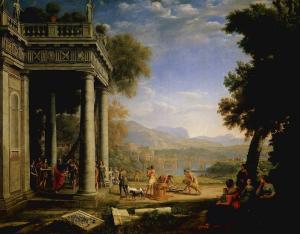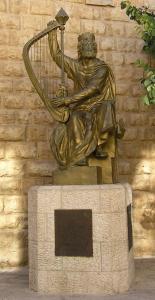 The great story of the rise and fall of King Saul and the rise and fall of King David, aided and abetted by the personally scheming Samuel, continues, although the lectionary this year avoids what surely is one of the more important tales in the longer story, the rejection and humiliation of Saul by Samuel at Gilgal. That story has often been read as a repudiation of Saul, because of his so-called refusal to obey the word of YHWH from the mouth of Samuel. That word was, and I quote, “Now go, and attack Amalek, and utterly destroy (cherem) all that they have; do not spare them, but kill both man and woman, child and infant, ox and sheep, camel and donkey” (1 Sam. 15:3). And Saul does precisely that, yet spares the very finest of the livestock and the king of Amalek in order to offer them all to YHWH in a great holocaust on the sacred mountain. There is exactly nothing in the command given by Samuel that demands that the destruction be done on the field of battle. Saul determines to complete cherem by a massive worship experience, but Samuel will have none of it, claiming that the living sheep are a breaking of YHWH’s command. They are not, and Saul calmly replies that he has saved the clean animals and the enemy king for sacrifice, thus completely fulfilling the command of YHWH (1 Sam.15:15). When Samuel rebukes Saul, he conveniently changes the command of YHWH he uttered earlier by adding the phrase, “fight against them until they are consumed” (1 Sam.15:18), though the original command said nothing of that. In short, Samuel wishes Saul to be deposed and here, as he did in 1 Sam.13, finds a poorly created half-truth to make that possible. Saul has done nothing to anger his God, but he has done all manner of supposed things to anger the prophet.
The great story of the rise and fall of King Saul and the rise and fall of King David, aided and abetted by the personally scheming Samuel, continues, although the lectionary this year avoids what surely is one of the more important tales in the longer story, the rejection and humiliation of Saul by Samuel at Gilgal. That story has often been read as a repudiation of Saul, because of his so-called refusal to obey the word of YHWH from the mouth of Samuel. That word was, and I quote, “Now go, and attack Amalek, and utterly destroy (cherem) all that they have; do not spare them, but kill both man and woman, child and infant, ox and sheep, camel and donkey” (1 Sam. 15:3). And Saul does precisely that, yet spares the very finest of the livestock and the king of Amalek in order to offer them all to YHWH in a great holocaust on the sacred mountain. There is exactly nothing in the command given by Samuel that demands that the destruction be done on the field of battle. Saul determines to complete cherem by a massive worship experience, but Samuel will have none of it, claiming that the living sheep are a breaking of YHWH’s command. They are not, and Saul calmly replies that he has saved the clean animals and the enemy king for sacrifice, thus completely fulfilling the command of YHWH (1 Sam.15:15). When Samuel rebukes Saul, he conveniently changes the command of YHWH he uttered earlier by adding the phrase, “fight against them until they are consumed” (1 Sam.15:18), though the original command said nothing of that. In short, Samuel wishes Saul to be deposed and here, as he did in 1 Sam.13, finds a poorly created half-truth to make that possible. Saul has done nothing to anger his God, but he has done all manner of supposed things to anger the prophet.
Hence, when Samuel goes looking for a new king in the out of the way village of Bethlehem, his choice of David is at the same time odd and unnecessary. Israel already has a king, the warrior Saul. There can hardly be two kings of a land, but Samuel sets up the rivalry by anointing a second monarch. And now the story of the anointing:
Though he had been told again by YHWH to go this time to the hick town of Bethlehem to find another king, Samuel was afraid. Saul was still king, even though Samuel had done his best to humiliate him at Gilgal, claiming that he had broken YHWH’s command for cherem against the Amalekites, though he knew full well that the command for cherem was an ambiguous one, and that Saul had chosen to fulfill the ugly demand in a way different than Samuel had had in mind. Just like his foolish offering earlier at Gilgal, an offering only the mighty Samuel was chosen to make, Samuel had waited beyond the time he had told Saul to wait for his coming in order to make Saul’s action appear stupid and blasphemous. As soon as the king had lighted the torch on the altar, Samuel had shown up, trying hard to suppress an evil smile. How delightful it had been to foil the so-called king! And a second time at holy Gilgal, he had humiliated him once again, and this time had rejected him, in the name of YHWH, as king over Israel. But why, Samuel wondered, had YHWH sent him to Bethlehem to search for another king? Did YHWH not know that Saul would be seeking a way to dispatch the prophet after his double humiliation on Gilgal?
Ah, that is why he led this unblemished cow with him to Bethlehem. It was a ruse, cooked up by YHWH, to come for sacrifice and to invite all the sons of Jesse to attend. I guess YHWH had made the choice from among the farmer’s sons, though Samuel had not a clue which one it might be. Jesse, an aging and wrinkled man of the green hills that surrounded the village, was terrified to receive the famous Samuel at his humble farm, but assembled seven of his sons, in order of their age, as commanded, before the expectant prophet. Samuel’s eyes were not as clear as once they were, but he readily saw that Eliab, the first-born, was a strapping lad with firm arms and legs, every cubit the image of a new king. So, he thought to himself, “Surely, the king stands before me.” But immediately, just before he was about to pour his holy oil on the lad, he imagined he heard YHWH say clearly, “Not him! No more tall guys! He is not the one.”
So, Samuel ambled toward the next boy, Abinadab, but his God apparently had not wanted him either. And so it went to Shammah, and through all seven of the sons of Jesse; YHWH rejected them all. Then why have I come, thought Samuel? Why have my aged legs walked this long distance for no purpose at all? While YHWH was rejecting the sons, the God had muttered something about not being taken in by outward appearance. Rather, Samuel thought he heard YHWH say, choose as I choose. Look on the heart! Well, the prophet mused, easy enough for a God to say, but I as merely human could only look at what my eyes reveal. Besides, none of these seven boys had passed divine muster.
“Are all of your boys here, Jesse,” shouted Samuel, perhaps a bit louder than he intended? “Great prophet,” Jesse in terror replied, “there is one more boy, David, but he is with the sheep.” Well, we will not sit down until this David shows up here,” said Samuel, but he thought that one more boy from this family would be no more noteworthy than his brothers.
Soon, David entered the sacrificial circle, and he was an exceedingly handsome boy, with ruddy, wind-blown complexion, especially luxurious reddish hair, and eyes that were bluer than the pools of Ein-Gedi. He was a wonder, this David, and despite YHWH’s warning about looking at the heart, Samuel saw only the outward appearance, and rushed to anoint him king, hearing nothing from YHWH, and astounding and infuriating the brothers and their father. David, king? David, shepherd, monarch over Israel? It was absurd, impossible, ridiculous! But without another word, Samuel left the circle and headed for home, while Jesse’s seven older boys muttered and coughed and began a bitter complaint that their youngest brother was somehow now king of Israel. But what of Saul? Was he not still king? How could a youthful shepherd boy, with hardly the start of a beard, and little knowledge of the world possibly be any kind of king?
Jesse looked as his grumbling sons, and then glanced at his youngest boy, trying to read the look on David’s face. Was it surprise? Expectation? Desire? Just how was David a king? Was there trouble ahead as two kings vied for power? Jesse pondered the problem, but like the prophet said nothing. Would David prove to be a man after God’s own heart? Only time would tell the truth or falsity of that hope.
Images from Wikimedia Commons











